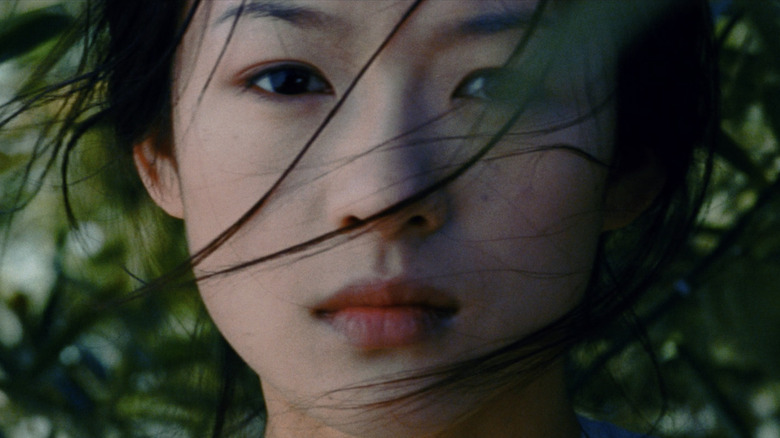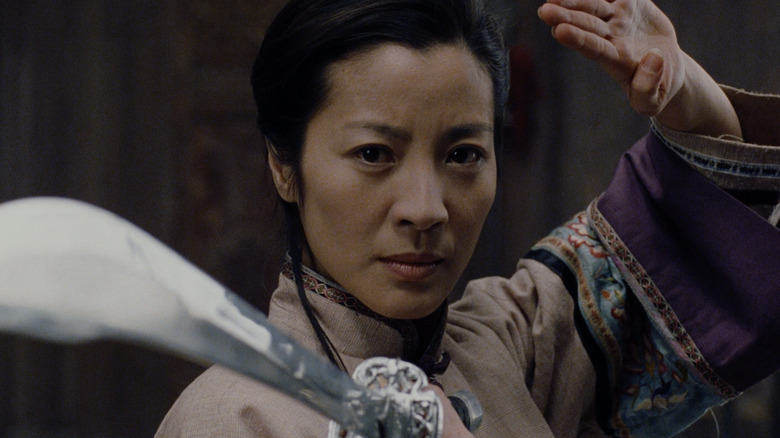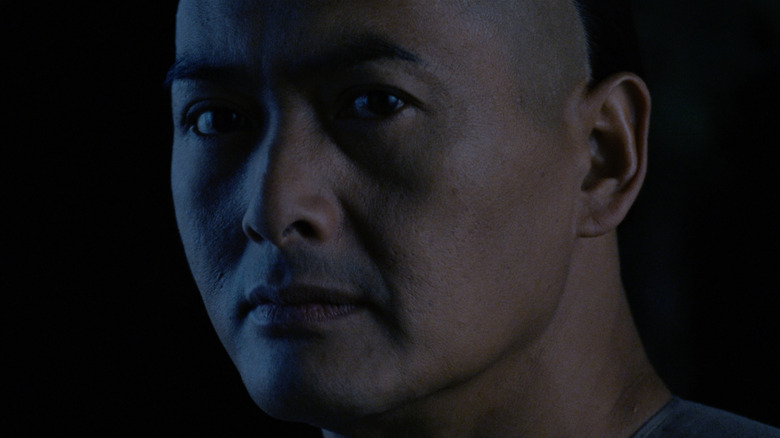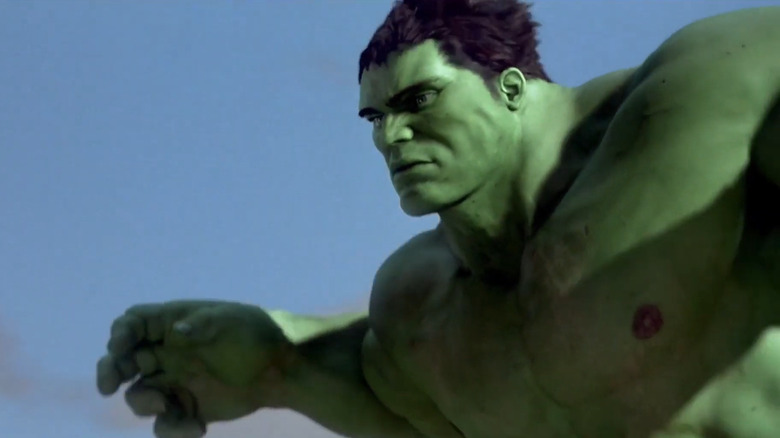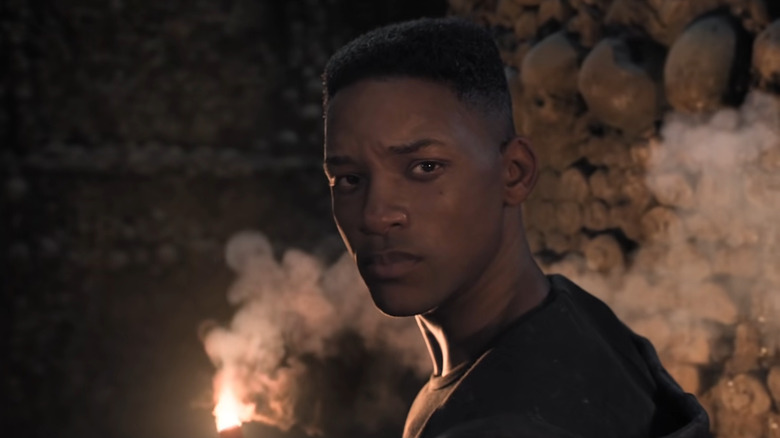Crouching Tiger, Hidden Dragon Fulfilled Ang Lee's Childhood Dreams
Before "Crouching Tiger, Hidden Dragon," we thought we knew who Ang Lee was as a filmmaker. This was a man who made low-key dramas and comedies about repressed emotions, usually within the context of a family. Films like "Eat Drink Man Woman" and "The Ice Storm" were stories about people struggling to express their feelings and not being able to communicate with the people in their lives. He was making movies for grown-ups, and he spent his career firmly establishing himself as one of the finest filmmakers working within that space.
Then, in 1999, he makes "Ride with the Devil." Ang Lee made a Civil War-era Western starring Tobey Maguire, Jewel, and Jeffrey Wright, and nobody saw it, making just a bit over $600,000 at the box office. Its critical reception wasn't that much better. It would be the most anonymous, forgotten film in his body of work, if it weren't for Criterion putting it in their collection, shifting that honor to "Taking Woodstock." While the film was largely ignored, it did signal that Lee was not content to just rest on his laurels, making these adult dramas and comedies for the rest of time. No, he was interested in genre entertainment and spectacle.
One year later, that shift into genre was in full effect with his wuxia epic "Crouching Tiger, Hidden Dragon." This was a period, Mandarin-language, martial arts film that managed to make over $200 million worldwide and get nominated for Best Picture and Best Director at the Academy Awards. At the time, this was a huge departure for Ang Lee. In reality, this was the kind of film he had always wanted to make.
Bringing fantasies to life
During the film's 20th anniversary, in an interview with Entertainment Weekly, Ang Lee said, "I had my fantasies since childhood" about making a wuxia film. You need to remember that Ang Lee may have gained a great deal of stature making English language films, but he was born and raised in Taiwan in the 1950s and '60s. This was the heyday of the Hong Kong-based Shaw Brothers Studio, which excelled in making these kinds of action films. Absorbing these films in his youth and gestating them over his filmmaking career, he figured out how to make his own wuxia film. He goes on to say in the interview:
"There are things I like about that genre, there are things I don't like. I think, 'Oh, it should be like this. It would look better this way, that way.' So I have a lot of things in my head ... and put it in one pot."
Its very interesting that someone's fantasies derive from a place where he felt like he could do what he was seeing better. Well, maybe not better, necessarily. Richer, at least. A lot of filmmakers just want to recreate the films that see in their youth, and some great films have been made doing just that. Ang Lee saw these wuxia films and needed something to make it his own. It turned out the answer to that links "Crouching Tiger, Hidden Dragon" back to all the other movies he had been making.
The repressed emotions are still here
While the wire-work action scenes and the sword fight choreography are what startled audiences back in 2000, "Crouching Tiger, Hidden Dragon" does not work without Ang Lee's trademark: repressed emotions. At the core of the film are two kinds of repression. The first is the love-that-could-have-been story between Chow Yun-fat's Li Mu Bai and Michelle Yeoh's Yu Shu Lien. Their inability to directly come out and say how they truly feel about one another because of perceived duty and societal norms is heart wrenching. The other repression comes from the patriarchal society's expectations placed upon Jen Yu (Zhang Ziyi), the daughter of a governor about to married off. She would much rather be a master warrior, secretly becoming the protégé of the notorious Jade Fox. Along with that, she also has a forbidden romance with a bandit going by the awesome moniker Dark Cloud (Chang Chen).
The aesthetics of it all may be different, but these are the same kinds of sociological and emotional pressures placed upon people in "Sense and Sensibility" or "The Ice Storm." Instead of those repressions bubbling over into an argument scene, they have a sword fight and fly up a wall to deal with their emotions. Ang Lee was fully aware of how he was piling all his proclivities on top of the genre, saying to EW:
"I bent [the genre]. I think that's the real difficulty ... Like, 'You want to fight... or you want to do drama?' I wanted it all. Because of that, I didn't realize I was upgrading a B-movie to A. You're supposed to go crazy, go wild. I was honing something really restricted and refined."
A signal to the future
As it turned out, finding that balance between the A and B movies is how he would operate going forward. His next film would do the very same thing with a popular superhero. Ang Lee's "Hulk" from 2003 is the not-as-successful blending of the emotion and spectacle he so perfectly managed in "Crouching Tiger, Hidden Dragon." In theory, the Incredible Hulk is a perfect vehicle for Ang Lee's interest in repressed emotions. Bruce Banner (Eric Bana) has to keep everything he feels buried, because if he lets it out, he becomes a giant green monster. And in Lee's depiction of the character, he brings it back to family, as "Hulk" is a big daddy issues movie.
The major difference between the two films is, even though "Crouching Tiger, Hidden Dragon" is this big action film with people flying through tress and whatnot, it is still presented in a very classical style, keeping with Lee's previous work. "Hulk" presents the story through constant split screens, meant to evoke the look of reading a comic book. Plus, Lee has this whole motion capture digital creation to deal with. These were brand new things for him. While "Hulk" has plenty of things to admire, you can tell he was just a little out of his depth with wrangling all of that. He may call "Crouching Tiger, Hidden Dragon" the "most difficult movie [he's] ever made," but it was more in his wheelhouse than he may have realized.
More intrigued by the spectacle than ever
Something about wanting to work with all that technology in "Hulk" must have set him off, because nowadays, that is seemingly all Ang Lee is interested in. Yes, he made "Brokeback Mountain" after "Hulk," but considering how he said he was "half-asleep" making that movie, it may not have been a passion project for him. No, we need to go to 2012 and "Life of Pi." Since then, all of Ang Lee's movies have been visual effects-driven, 3D movies, with the most recent, "Gemini Man," two being shot in 120 frames per second. Instead of pushing his films into richer emotional places, he is pushing for technological breakthroughs and evolving how people make movies. In "Gemini Man," I am a fan of how he is truly revolutionizing what a film can look like, but I am under no illusion to say that it features any kind of satisfying emotional backbone.
Ang Lee started making these big spectacle movies as a way to fulfill some childhood fantasies, but I think he is getting a little lost in those fantasies. He is starting to lose sight of what made him such a distinctive filmmaker, becoming all consumed with the tech rather than the people he is telling stories about. I have no doubt that Lee could arrive at that balance once again. If you give him the right screenplay that rides that line between A and B movies, he could very well make another masterpiece. I just hope he is looking for those scripts, because when Ang Lee is totally on his game, he creates immensely beautiful pieces of cinematic art.
